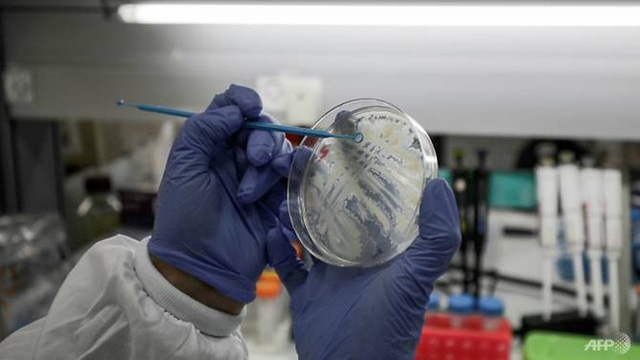What if the world had not yet found the Covid-19 vaccine?
- Tram Ho
There is no guarantee we will soon have a Covid-19 vaccine. Therefore, we need research to understand the best ways to wear masks, wash hands and other interventions to control the spread of disease.
The Covid-19 epidemic curve has been “flattened” in many countries around the world but no new anti-virus drugs or vaccines have been completed.

| Scientists around the world are racing to develop a vaccine against Covid-19. Photo: AFP |
We have so far largely survived the epidemic mainly through non-drug interventions such as isolation, social separation, hand washing, and with health workers using masks and devices. other protectors.
We all hope to have a vaccine by 2021. But in the meantime, what should we do? And more importantly, what happens if the vaccine does not appear in the near future?
The world has bet most research funds on the search for effective vaccines and drugs against Covid-19. It is undeniable that this effort is necessary, but it should be accompanied by research on how to address and improve non-drug interventions, which are effective ways. Only to cope with the current disease.
There has been a lot of debate over basic questions like whether the public should use a mask, whether we should stand 1, 2 or 4 meters apart and whether we should wash our hands with soap. disinfectant room or water? Those are the questions we need to answer immediately.
What are non-pharmacological interventions?
According to medical researchers, non-pharmacological measures are the subject of about 40% of clinical trials. However, these measures receive far less attention than drug development and assays.
During the Covid-19 pandemic, a lot of money was given to research groups around the world to develop vaccines and drug trials that have potential against viruses.
Hundreds of clinical trials of drugs and vaccines are underway, but we can only find a few trials for non-pharmacological interventions and in particular, none how to improve these measures.
The whole world put its efforts and hopes into the successful development of a drug or a vaccine to treat Covid-19. However, many experts, including Ian Frazer, who developed Australia’s HPV vaccine, said that this would not be easy or fast.
If an effective vaccine or antiviral drug has not yet appeared, we need a Plan B to use non-pharmacological interventions. That is why we need high quality research to determine which measures are effective and how to make them as effective as possible.
The importance of non-pharmacological studies
We often think of hand washing, wearing masks, social spacing are simple measures and do not need research. In fact, non-drug interventions are often much more complicated.
Developing and implementing a non-pharmacological intervention is very different from developing a vaccine or drug.
For example, we have a “mask for everyone” strategy (# Masks4All) to encourage people to wear masks. But the question is what kind of mask do we need to wear, and what should the material of the mask be? When and where to wear? There is very little discussion about these specific questions.
Or washing your hands may sound like a simple measure, but how many times should we wash our hands? 2 times / day, 10 times / day or any other specific number? What is the best way to teach people to wash their hands properly?
Besides, is it better to wash your hands with dry hand soap than with soap and water? Which mask and hand washing are more effective or both of these measures?
Those are just a few of the many other things we don’t know about non-pharmacological interventions.
Other non-drug options are also broad, including environmental studies, such as temperature, air condition, and surfaces (such as SARS-CoV-2 “die” faster). on copper surfaces compared to other hard surfaces).
In addition, is there a certain epidemic control measure we are currently taking that doesn’t work? Probably yes. But the problem is we don’t know which one it is. We need to know this as soon as possible because we should not waste time, effort and resources on ineffective measures.
The next pandemic
If we are successful in developing a vaccine against Covid-19, we will consider it as an “escape” during the current pandemic. But what if the next pandemic or other disease outbreaks occur?
Vaccines only work against certain viruses, so if a new virus threatens us next time, we will end up in the same situation as the Covid-19 pandemic or even worse. .
However, what we learn now from non-pharmacological interventions may be helpful to protect us against other viruses, while waiting for new drugs or vaccines to emerge.
We have had the opportunity to study non-pharmacological interventions for previous respiratory viruses, especially during the 2003 SARS epidemic and the 2009 H1N1 flu.
However, many opportunities for more in-depth analysis have been wasted and we are now desperately searching for answers to the questions we once asked.
Research Plan B
To prepare for the future and Plan B, in the event that the vaccine does not appear, we need to conduct randomized clinical trials with non-pharmacological measures to prevent the spread of the virus. Respiratory.
The pandemic is now giving us a rare opportunity to quickly conduct trials, answering many questions we don’t know about a range of non-pharmacological interventions.
Vaccine and antiviral research is the best way to overcome the Covid-19 pandemic, but focusing all of the financial resources, efforts, and resources on these studies could turn into an expensive mistake. prices, and at the same time cause both economic and economic harms like gambling “to eat, to zero”. Therefore, we always need a Plan B to cope with disease, not only with Covid-19 but also in future pandemics./.
Source : Genk
